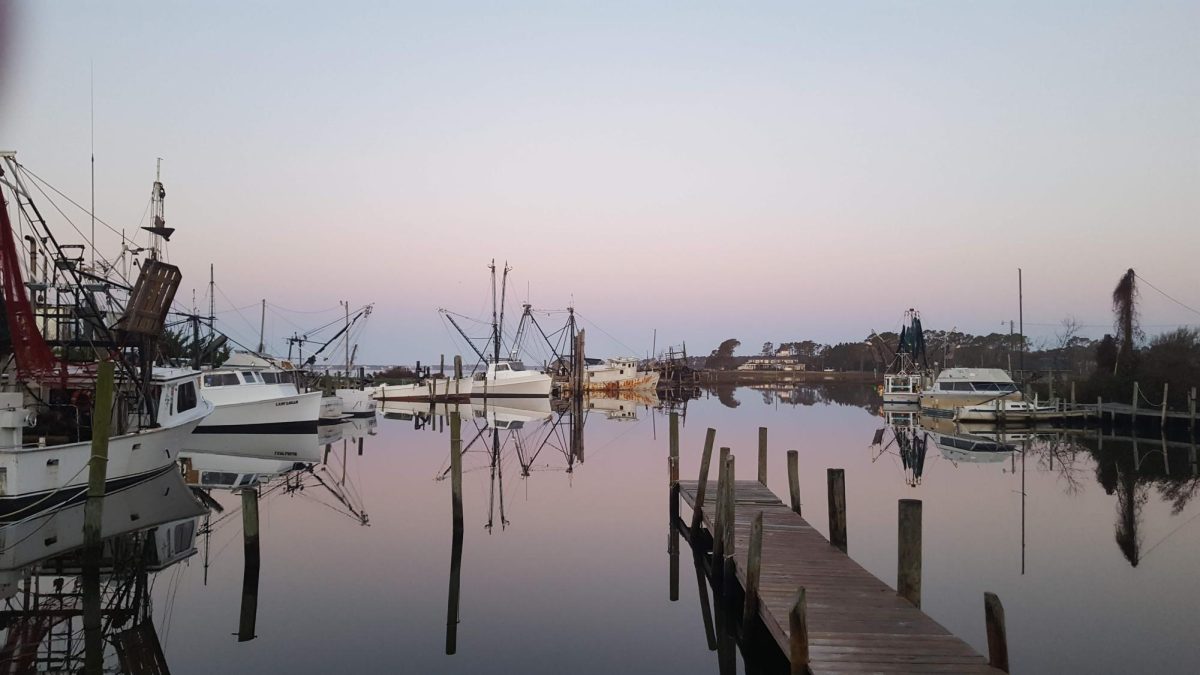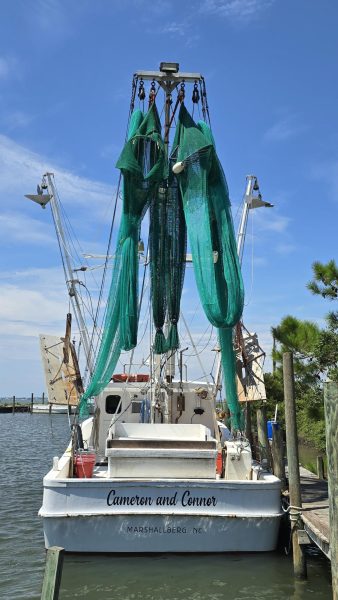
Paul Lewis
A proposed ban on inshore shrimp trawling in North Carolina waters ignited one of the largest mobilizations of coastal fishing communities in recent memory, flooding the General Assembly in late June with fishermen, advocates and truckloads of free shrimp.
The measure, added in the final days of the legislative session to House Bill 442, would have prohibited shrimp trawling in the Pamlico Sound and other inshore waters. Supporters argued it was a necessary step to protect seagrass, juvenile fish and coastal ecosystems. Opponents called it a rushed political maneuver that ignored both science and the economic lifeblood of small fishing towns.
“It went through two committees and the Senate floor in under 48 hours,” said Monica Smith, who manages Beaufort-based Miss Gina’s Shrimp. “It went through those committees faster than some people could get home from shrimping, and it would have finished that week had we not stopped that.”
Smith’s family operation sells roughly 90% of the shrimp caught by their two boats directly to customers or to inland sales. She says about 15% of her husband’s income comes from waters outside what would have been shut down.
“Boats can’t run on 15%,” Smith said. “You can’t maintain a $100,000 shrimp trawler on 15% of your income. So that part of our business would, I’m sure, cease to survive.”
Smith said the retail side of the business might attempt to buy shrimp from elsewhere, but she doubts it could replace their brand built on “fresh, local seafood” caught and sold immediately. She also warns that cutting domestic shrimp production would leave the state more dependent on imports that face minimal inspection.

“About 1% of all imported shrimp are tested at the port of entry,” Smith said. “Out of that 1% a tremendous amount of them are kicked out for antibiotic use. And we’re talking like antibiotics that you would get at a doctor’s office to treat an infection, and we’re putting them in our food.”
The bill’s most vocal opponents pointed to existing regulations they say already address concerns about bycatch, or the unintentional catching of small fish while shrimping, and habitat damage, including required turtle excluder devices, bycatch reduction devices and seasonal closures in sensitive areas.
Chris Stewart, a biologist supervisor at the N.C. Division of Marine Fisheries declined an interview but pointed to the agency’s existing shrimp management framework.
Paul Lewis, a third-year studying engineering and a Marshallberg, North Carolina native, stood on the harbor docks this summer, pointing out the federally-mandated escape hatches sewn into local nets.
“North Carolina leads when it comes to bycatch reduction, and a lot of other states, essentially all of the states look towards us to determine how to reduce bycatch, because North Carolina does a ton of research into it,” Lewis said.
On top of already-existing regulations, Lewis also believes the effort was driven in part by development interests.
“There are people who’d love to see these shrimp boats gone so they can put their yachts here,” Lewis said. “What better way than banning the work that keeps them here?”
Like other opponents, Lewis sees the industry as essential to his town’s identity.
“In the Down East communities, we’re like brothers and sisters,” Lewis said. “We all will argue and fight with each other, but as soon as somebody who we consider an outsider threatens one of our communities, we all tend to band together. I’d hate to see these shrimp boats go.”
When news of the amendment broke, word spread quickly through fishing docks, Facebook groups and county commissioner offices. Within days, caravans of shrimpers and their supporters rolled into Raleigh. They brought two massive coolers of shrimp to give away as they lobbied lawmakers, and a convoy of 16 refrigerated trucks circled the legislative building in protest.
“We came there, not ready to fight, but we came there hoping to convince and just show what we do, and how a lot of people actually misrepresented us,” Lewis said.
Dare County Commission Chair Robert “Bob” Woodard called the turnout “incredible.” He estimated hundreds surrounded the building while a convoy of refrigerated trucks circled it all day, displaying “Save Our Industry” signs.
“I’ve been to Raleigh multiple times to fight issues, but this is the biggest by far contingency of people fighting one particular bill that I’ve ever seen in my career as a commissioner,” Woodard said.
By late June, House leadership announced the measure would not move forward. Speaker Tim Moore and other Republicans signaled there was not enough support to take up the amended bill before adjournment.

The North Carolina House’s decision effectively killed the proposal, but few in the fishing community are calling it a permanent victory. Many, like Smith, expect the issue to return when lawmakers reconvene in 2026.
“We have to keep this alive in people’s minds,” Smith said. “Because this is coming back. We’ll be lucky if it holds off until January.”
Woodard had already been in talks with other coastal leaders about forming a unified front. The amendment, he said, “was the straw that broke the camel’s back.” Within weeks, chairs from all 19 coastal counties agreed to join a new North Carolina Coastal Counties Fishing Coalition to coordinate political advocacy and share data.
“If we do the coastal counties, that’ll represent one voice, that’ll represent 20% of all the counties in the entire state,” Woodard said. The group will meet in September to compile data and prepare for what many see as another round of legislation.
“We have a feeling … somehow or another, the Senate is going to bring this back up, so we want to be ready for them,” Woodard said.
That wariness is shared across the docks.
“No, it’s never been a victory,” Lewis said. “This is not the first time any of this has happened … there’s no doubt at some point, we’ll have to fight this fight again.”
Looking forward, Smith said the state’s fishing community is stronger than ever.
“I think that they thought that they were going to tear us down, and they gave us the biggest platform and made us the strongest that the commercial fishing industry has ever been,” Smith said. “… For the first time in forever, probably, the commercial fishing industry is going on the offense instead of being on the defense like we have been.”